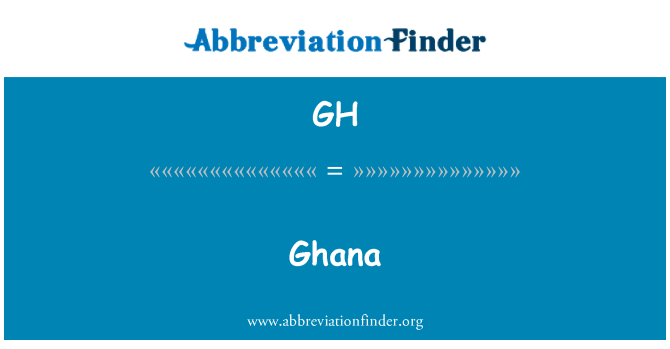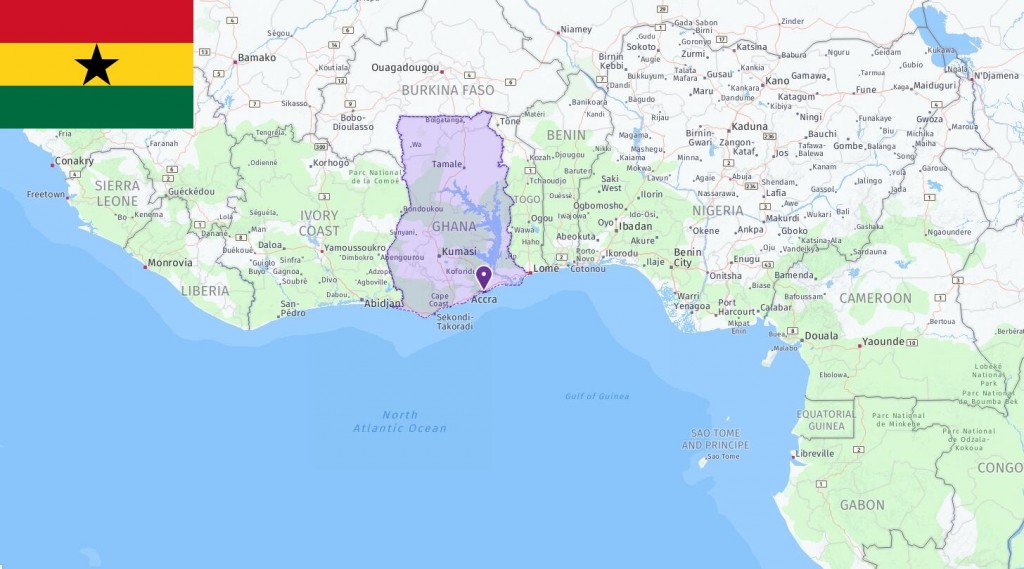GH is the abbreviation for Ghana, the 80th largest country in the world. Officially the Republic of Ghana, Ghana is a country located in West Africa, bordering 4 countries – Burkina Faso, Guinea, Ivory Coast, and Togo. Accra is the capital city of Ghana. Top 10 biggest cities are Accra (population: 1,963,253), Kumasi (population: 1,468,598), Tamale (population: 360,568), Takoradze (population: 232,908), Achiaman (population: 202,921), Tema (population: 155,771), Cape Coast (population: 143,004), Sekondi-Takoradi (population: 138,861), Obuase (population: 137,845), and Medina Estates (population: 101,196).
Country Profile
- Capital: Accra
- Language: English
- Area: 239,567 km2
- Population: 28,308,289
- Currency: Ghanaian cedi (GHS)
- Time zone: UTC+0
- Calling code: 233
- ISO 2-Letter Abbreviation: GH
- UN 3-Letter Abbreviation: GHA
- Internet TLD: .gh
- State Government Website: http://ghana.gov.gh
List of Ghana Acronyms
The most commonly used abbreviations about Ghana are GH which stands for Ghana and GHS which means Ghanaian cedi (Ghana currency). In the following table, you can see all acronyms related to Ghana, including abbreviations for airport, city, school, port, government, and etc.

Geography
Ghana has a varied nature. The coastal area is characterized by sandy beaches, mangrove forests, grasslands and cultivated land. In the southwest lies a lush rainforest area, and in the southeast, nature is characterized by wooded mountain areas. In the north, the landscape is characterized by savannas. Over half of Ghana’s land area is less than 150 meters above sea level. The country’s highest peak is Afadja, at 885 meters above sea level, one of the world’s largest artificial lakes, which characterizes central parts of the country. Along the coast, the climate is tropical hot and humid throughout the year, with rainy periods from March to July, and from September to October. The climate in the north is influenced by desert winds from the northeast, with large variations in temperature and precipitation. Here it is dry season from October to March and rainy season from April to September.
One-third of Ghana’s land area is threatened by desertification, which is compounded by the use of sway, overcrowding, overgrazing and harvesting. The country’s northern parts are regularly exposed to prolonged and devastating periods of drought. Emissions from industry and agriculture, as well as inadequate waste management, lead to widespread water pollution. Part of wildlife in the country is threatened by illegal hunting.
History
Various peoples and agricultural communities have lived in Ghana since 1400 BCE. From the 1300s, various kingdoms and communities arose in the area. The most powerful kingdoms grew in northern Ghana, trading gold and coal nuts through the Sahara. In the 19th century there were over 100 different kingdoms in the area. The largest, the Ashanti Federation, evolved to become the economic and administrative center for the area.
Several different European nations established trading stations along the Ghanaian coast from the 15th century. The most important commodities were gold, slaves and ivory. Throughout the 19th century, Britain gained control of the coastal areas, and in 1901 when the Ashanti Federation was defeated by the British, the whole area became a British colony under the name Gold Coast. Resistance to the British increased after World War II, and in 1957 Ghana became the first former colony in West Africa to achieve independence.
In 1966, the military took power in the country. The time that followed was marked by political instability and economic downturns. Democratic reforms were not implemented until the 1990s. The election in 2000 became a turning point for Ghana, as the presidential shift took place through a democratic and free elections for the first time in the country’s history.
Society and politics
Ghana is a presidential republic with a multi-party system. The executive power lies with a president elected in the general election for four years. The president can only be re-elected once. The president himself chooses the vice president and the government, but these must be approved by parliament.
Ghana is considered one of the most stable democracies in sub-Saharan Africa. In recent times, the policy has been characterized by combating corruption and increased focus on the school and health care system. Ghana also has an active foreign policy and often participates in UN peacekeeping operations.
The country has many different ethnic groups, but unlike the neighboring countries, there have been few ethnic conflicts. However, disagreement over property conditions in the north of the country led to ethnic unrest in the mid-1990s. By 2002, 36 people were killed in violent riots. Women’s oppression is forbidden, but tradition and traditional gender roles mean that women often have fewer opportunities for work and education than men. Sexual minorities have few rights, and homosexuality can provide severe penalties.
Economics and Commerce
Ghana has enjoyed good economic growth since the 2000s, and the proportion of poor people has dropped dramatically. The health system has major shortcomings and shortcomings, but in recent years, child mortality has decreased and life expectancy has increased. Poverty is most prevalent in the north, and in slums around the largest cities.
In 2010, Ghana began extracting oil, which led to great economic growth. The oil industry helped make the country go from being a “low-income country” to a “middle-income country”. The most important economic sector is the service industry, which accounts for over half of the gross domestic product. Agriculture, forestry and fishing employ the majority of the population, accounting for around 20 percent of the gross domestic product. The country also has a developed industrial sector. The most important industrial products are aluminum, cement, textiles and transport equipment. The country’s most important export goods are cocoa, gold and timber, making the economy vulnerable to fluctuations in world prices. Ghana is part of the West African free trade cooperation ECOWAS and has good trade relations with Europe and Asia.
View this article in other languages:
Deutsch – Français – 繁體中文


